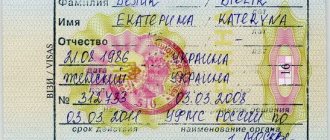The legislator requires a citizen of the Russian Federation and all persons staying on the territory of Russia to obtain permanent or temporary registration. Failure to fulfill this obligation is equivalent to an administrative offense and those found guilty may be punished by a fine or deportation. Why registration is needed and where you can apply for it, what to do and what to do if you have nowhere to register - we’ll talk about this in the article.
Cameraman Alisa Lawyer
Dear readers! Our articles discuss typical situations for resolving legal issues, but each problem is unique. Therefore, if you need a FREE consultation with a lawyer, call ext 946 (Moscow and Moscow region) ext 651 (St. Petersburg and Leningrad region)
What to do if there is nowhere to register?
If there is nowhere to register, what should you do (Russia)? This question is relevant for those categories of people who, for objective reasons, do not have their own housing. First you need to soberly assess the situation. It is quite possible that there are relatives, even in another region, who will give you the opportunity to register in their apartment and will not leave you without housing.
The current legislation does not contain the term “registration”. We are talking only about temporary (at the place of stay) or permanent registration in a residential area.
If a person has nowhere to register, then he has the right to choose one of several options for living space to solve the problem:
- hotel;
- sanatorium;
- pension;
- Holiday House;
- camping;
- tourist base;
- medical institution;
- establishment of a penal system;
- rented apartment, etc.
In the above-mentioned places, citizens have the right to receive only temporary registration. If we are talking about permanent registration, then it can be done in:
- residential building;
- room;
- apartment;
- premises of a specialized housing stock in which a citizen lives as an owner or under a social tenancy agreement, etc.
The main condition is that the premises be recognized as suitable for habitation.
So, what should a citizen of the Russian Federation do and what should he do if he has nowhere to register?
If you have a house in the village, you can always register there. Even if it is in a remote area and no one lives there. The main thing is that the house is on a land plot for individual housing construction. If we are talking about land for agricultural, industrial, etc. purposes, then the place of residence will not be subject to registration and you will need to look for another address.
Some citizens apply for registration in dilapidated housing. This does not contradict the law, however, the premises must have living conditions. The same applies to registration in emergency housing.
An alternative is registration in official housing. But for this it is necessary to obtain the permission of the employer, since in a departmental premises there may be no conditions for recognizing it as residential, or the employee may be provided with an apartment for a certain period. In this case, the registration should equal this time.
Where to turn if there is nowhere to register? Some citizens, for a certain fee, provide temporary registration services in the apartments they own. Everything is formalized, but this procedure costs more than if you buy a dacha in SNT and register in it.
If you are interested in the question: “I received a temporary residence permit, but there is nowhere to register,” then there is only one answer - you need to rent an apartment or live in a room for a temporary stay, for example, in a hotel. There is an option to require official housing from the employer.
Responsibility
Living without registration has serious consequences and involves the application of administrative measures to the culprit. They are expressed in the imposition of a monetary fine on the violator. In this case, the punishment applies not only to the resident himself, but also to the owner of the property, including a legal entity, and the tenant of the municipal premises.
In this case, liability occurs if a number of conditions are met. First of all, a person must reach a certain age. The offender must be over sixteen years of age. If he is younger, then his legal representatives will be held accountable. Then the fact of the violation itself must take place, that is, the person must violate the established registration deadlines. Finally, there must be guilt. That is, the offense became possible due to the fault of the resident himself. For example, if a person submitted all the necessary documents, properly executed, and the specialists of the Ministry of Internal Affairs violated the deadlines for registration, the initiator is released from liability.
Also, measures of influence are not applied to persons who were in a state of insanity, that is, they were not aware of their actions and could not control them.
Amount of fine
The sanctions that apply to those responsible are specified in Article 19.15.1 of the Code of Administrative Offenses of the Russian Federation. A financial fine is imposed on the violator.
In this case, a person will be required to pay from two to three thousand rubles, an employer or owner - from two to five, a legal entity - from two hundred and fifty to seven hundred and fifty. Living without registration in cities of federal significance, Moscow or St. Petersburg, threatens a person with a fine of three to five thousand, the owner or tenant - from five to seven, an organization - from three hundred to eight hundred.
Where to go to register?
You can apply for a temporary residence permit (registration) by contacting the migration service. Only this state body has the authority to record the location of a person on the territory of the Russian Federation.
However, in addition to a personal visit to the FMS, a citizen has the right to use the State Services portal. To do this, he needs to register or log in to his personal account, if available.
Next, go to the services page and select the tab related to registration and citizenship. In the window that appears, you need to select temporary registration and click on the button on the right about online registration.
When submitting an application, you must fill out all the required fields. If the document is accepted for processing, the applicant must wait for the service to be completed. This will be reported in your personal account.
For reference! The FMS carries out registration activities free of charge. You do not need to pay any state fees to register.
Registration agreement without ownership rights
When granting the right to reside in your living space to third parties by registering, you must insure yourself against possible unpleasant moments.
A registration agreement without ownership rights can be a guarantee of compliance with your requirements, legislation, as well as confirmation of mutually agreed decisions between you and the person wishing to register. Often, this is an agreement for the rental or gratuitous use of residential premises, indicating the right of registration.
The contract must indicate:
- type of registration (temporary, permanent)
- registration deadlines (if it is temporary)
- number of new residents
- rights and responsibilities of new residents
- degree of relationship (if relatives are registered)
- an indication that those registering do not have any rights to own the living space or part of it, as well as the disposal of the property located there.
It is best to have such an agreement notarized, which will give it greater weight in the eyes of the law.
The procedure for registering citizens of the Russian Federation
Temporary registration of a citizen is carried out if he remains on the territory of the subject for more than 90 days. If we are talking about staying in holiday homes, tourist centers or other similar institutions, then he needs to contact the administration, that is, use the simplified procedure.
When a family rents an apartment, registration is carried out only with the consent of the owner of the residential premises when writing the appropriate application.
Forced migrants must first establish this fact, obtain status, and only after that submit documents for registration in the general manner.
For reference! The owner can register an unlimited number of persons in the apartment. However, when a signal is received, the migration service has the right to check whether these citizens really live there. Otherwise, the homeowner will be held accountable.
If a citizen has changed his place of residence, he must inform the FMS about this no later than 7 working days. He takes the following documents with him:
- passport;
- registration application;
- paper is the basis for using the premises.
After all verification procedures have been completed, a registration stamp is placed on the identity document.
Required documents
For registration you need to prepare and provide the following documents:
- Civil passport of the applicant, as well as the owner of the premises;
- Consent in writing from other owners;
- A paper confirming ownership of an apartment or other premises;
- Certificate of general family composition;
- If the housing is official, provided by the employer, appropriate permission will be required;
- A formal social tenancy or rental agreement.
Once the request has been processed and the document has been reviewed, the official registration stamp is affixed to the passport.
Where can I register if I don’t have my own home?
It is necessary to contact the social security authority and register with the labor exchange as an unemployed person. After a citizen finds a job, they will enter into a social tenancy agreement with him on preferential terms, and he will have a specific place of residence where he can register.
Thus, if a person has nowhere to register, he can draw up a social rent agreement if he is recognized as needy. Registration at temporary places of stay (boarding house, hospital, etc.) is also allowed. But when you are discharged, but there is nowhere to register, you need to go to court to protect your rights. You can register in an apartment only with the consent of all owners.
Restrictions on rights
In Art. 3 of Law of the Russian Federation No. 5242-1 states that the lack of registration at a certain address should not limit a person’s rights, which are provided for in modern legislation. Despite this, a person often faces many problems. In particular, it will not be able to perform the following operations:
- Obtaining a general health insurance policy and using free medical care. You can visit government clinics if you have registration in another city in the Russian Federation. Then you just need to register with a clinic in your host city.
- Registration of children for school and city children's institutions.
- Get on the waiting list to improve your living conditions.
- Registration of mortgages and loans.
- Obtaining a standard driver's license.
- Registering an LLC or obtaining individual entrepreneur status to run a business.
- Get married, dissolve it, obtain a certificate for children and perform other operations at the city registry office.
- Open an account at a financial institution.
Quite often, a person is denied employment due to lack of registration.
To protect their rights, a person must obtain a written refusal from the employer or send a statement of claim to the court. This situation is quite difficult to resolve, since employers are well aware of the consequences of their refusal and come up with other reasons for refusing to provide a job.
Reasons for lack of heat
There are many options for not delivering coolant to consumers, but a sharp drop in temperature forces homeowners to act energetically. We will look separately at the areas of responsibility defined by the legislative acts of the Russian Federation, the non-supply of energy resources, and their possible causes.
Before writing a complaint about the lack of heating in the apartment, decide on the reason and who to file the complaint against.
Heat supply organization
When drawing up an agreement between a management company and a heat supply organization, the boundaries of responsibility for the regime and quality of provision of utility services are indicated (clause 21 of Resolution No. 354). The heat supplying organization is responsible for the condition of the heating main up to the first shut-off valve of the heating unit of the general house heating system.
The lack of coolant supply has the following reasons:
- There was no period when the air temperature fell below +8 C for 5 days in a row (Government Decree No. 354). Here the question is that there is no heating in the apartment, there is no point in complaining, the heating period has not yet begun. There will be no heat in all apartment buildings powered by this boiler room.
- The boiler room equipment is faulty or there was a break in the heating main during pressure testing. Here the organization itself will try to remove the fault as quickly as possible. Claims for violation of consumer rights can be sent to the management company if the air temperature in residential premises is below the standard.
- Insufficient coolant temperature or low pressure.
Area of responsibility of the management company
The management company's area of responsibility includes the entire heat supply system of an apartment building from the heat input unit. This includes shut-off and distribution valves, inlet and outlet pipes, a common house meter, and risers.
Areas of responsibility for the condition of the central heating system
When the house has a zoned floor-to-floor distribution of coolant, the area of responsibility ends at the first shut-off valve of the apartment-by-apartment heat supply system of the floor heating unit.
The management company must provide favorable and safe living conditions for citizens, proper maintenance of common household property, and provide high-quality utilities (clause 31 of Resolution No. 354).
Malfunctions that often occur in the home heating system:
- Burst of a pressure pipe in a heating point or distribution system, including risers, during pressure testing or after it.
- Malfunction of shut-off and control valves.
- The system is unbalanced, everything works, but the heating radiator in the apartment does not heat well.
- Remaining air in the system.
In these cases, problems are resolved by the technical means of the management company in the shortest possible time. The batteries will remain cold throughout the entire apartment building or individual floors along a specific riser.
Ask your neighbors how their heat supply is, whether all the radiators are hot, which riser is not working, perhaps they have already filed a complaint about poor heating in the apartment, where should they complain to you. Unbalance occurs when there is a lack of pressure or a malfunction of the balancing pair of valves of a particular riser. It happens that the neighbor from below, without authorization, changed the devices to new ones with higher hydraulic resistance, for which he will be punished (points 35 c, e, c No. 354).
Consumer zone
Checking the radiator
With a riser system, the wiring, starting with the tie-in into the riser, pressure pipes, returns, heating elements of the apartment - all this is the responsibility of the consumer. With zoned floor-to-floor wiring, this zone starts from the first shut-off valve towards the apartment or distribution cabinet.
The consumer bears full responsibility for the condition of the apartment's heat supply system. Hence, complaining, if there is no heating in your apartment, does not make sense; you can make an emergency call through the dispatch service to shut off the coolant supply at the scene of the accident.
In addition, the consumer bears financial responsibility to other residents affected by the accident. With zoned floor-to-floor wiring, the consumer can freely install any heating elements, even install heated floors with a connection to the central pipeline.
For any of the above malfunctions, contact the management company to resolve the issue. She is the first resort to contact if there are problems with heating in the apartment.
Types of electricity meters
Homeowners can independently choose what type of meter will be installed in their premises. There are two types: mechanical (induction) and electronic. They have different mechanisms for calculating consumed resources and can keep records at single-tariff or multi-tariff rates. Let's look at each type in detail to have a more complete understanding of their operating principle.
Electronic
Most premises have exactly these types of metering devices installed. Their popularity is due to several factors:
- the ability to keep records in two or three-day zones;
- high accuracy class of the device;
- connecting one meter to networks of different voltages;
- some are equipped with remote transmission of readings.
The principle of operation of the electronic meter is that its sensor, which receives a signal about the power used, converts it and sends it to the microcontroller. The latter deciphers the received encoding and the display of the device displays numbers indicating how much electricity the residents of this facility consumed.
Induction
This type of electricity meters is also called mechanical, since its design is quite simple. It is a box, behind the glass of which you can see a mechanical dial and a rotating disk. The change in value on the dial depends on the number of revolutions of the disk and its rotation speed.
The operating principle itself is as follows:
- The coils create a magnetic field, and a disk is placed between them. The higher the power consumption, the greater the magnetic flux strength, and the rotation speeds up accordingly.
- The dial changes value depending on the number of rotations of the disk.
- The device also contains a permanent magnet, which creates additional stabilization for the rotating mechanism.
Reference! With modern induction meters, the disk can be hidden and only the mechanical dial is visible.
Sources
- Novak, Boris Bribe and kickback / Boris Novak. - M.: Publishing House "Peter", 2008. - 144 p.
- Contract Law / ed. G.V. Petrova. - M.: Image, 1992. - 593 p.
- Practical accounting. Official materials and comments (720 hours) No. 10/2015; Science - Moscow, 2015. - 666 p.
- Tatyana Yuryevna Sidorova Diplomatic and consular law. Tutorial; Prospect - M., 1985. - 576 p.
- Velyaminov, G.M. International economic law and process / G.M. Velyaminov. - M.: Wolters Kluwer, 2004. - 496 p.
Details about where, where and with whom a minor child should be registered
The issue of registering a minor cannot be treated formally, since the lack of registration infringes on the rights of children.
Without registration, unemployed mothers will not be able to receive child benefits, and without registration, the child will not be accepted into school. In order to avoid unnecessary problems, it is necessary to carefully understand the nuances and rules for registering minors.
Dear readers! Our articles talk about typical ways to resolve legal issues, but each case is unique.
If you want to find out how to solve your particular problem, please contact the online consultant form on the right. It's fast and free!
When do you need to legalize the redevelopment of an apartment?
The first step is to study what can be changed in the apartment and what is directly prohibited. Residents of Moscow can find and read paragraph 2 of Appendix No. 1 according to Moscow Government Decree No. 508-PP. There is also a set of design rules called SP 54.13330.2016. Regions have their own regulations - they are not very different, it is also better to read them separately.
These include:
- Enlargement of some rooms, for example, a bathroom and toilet due to part of the corridor.
- Arranging an arch in the wall between the room and the balcony (“French window”).
- Demolition of partition in the bathroom.
- Replacing a bathtub with a shower stall.
- Construction of new partitions from lightweight materials, such as plasterboard.
- Dressing room equipment.
- Laying a new floor surface without changing the internal structure.
- Installation of a glass door between the kitchen with a gas stove and the living room.
There are works that cannot be coordinated. They should not be carried out in an apartment at all, as this may compromise the integrity of the ceilings and create a threat of their collapse. What cannot be done is described in detail in paragraph 10 of Appendix No. 1 of PP No. 508-PP - for example:
- demolition of load-bearing walls;
- transfer of heating elements (batteries);
- turning a bathroom into a living room (and vice versa);
- connecting the heated floor to the general house heating system.








